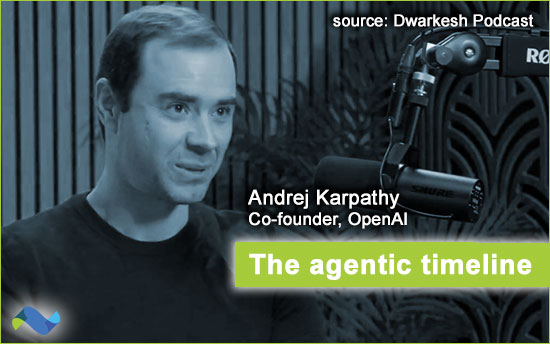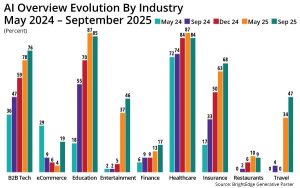LLMS & CHATBOTS
Too early for agentic advertising?
In an interview on the Dwarkesh Patel podcast released on Friday, Andrej Karpathy, the co-founder of OpenAI who coined the phrase “vibe coding” in February, played down the near-term advances he expected from AI agents —guiding instead for a longer time frame.
DWARKESH PATEL: “…why do you say that this ‘will be the decade of agents and not the year of agents’?”
ANDREJ KARPATHY: “(…) So the quote that you’ve just mentioned, it’s the ‘decade of agents’, that’s actually my reaction to a pre-existing quote (…) I’m not actually sure who said this, but they were alluding to this being the year of agents with respect to LLMs and how they were gonna evolve.
And I think I was triggered by that because I feel like there’s some over-predictions going on in the industry. And in my mind, this is really a lot more accurately described as the decade of agents. We have some very early agents that are actually extremely impressive and that I use daily, you know, Claude and Codex and so on.
But I still feel like there’s so much work to be done. And so I think my reaction is like, we’ll be working with these things for a decade, they’re gonna get better and it’s gonna be wonderful…”
Hear more on X or the Apple Podcasts app. (October 17)
More: As workers fear for AI job cuts, Open AI co-founder says AI agents will take a decade before they even work: ‘They don’t have enough intelligence’ (October 20) – Fortune (subscription)
From tipsheet: A 10-year runway for agentic maturity may not be necessary for the advertising technology industry which arguably saw the programmatic ecosystem develop over a decade. Let’s use 2007 as a ‘born on’ date for programmatic: Right Media was acquired by Yahoo!, DoubleClick was acquired by Google, and AdECN was acquired by Microsoft. By 2017, programmatic was pumping.
In this next wave of AI innovation, one would expect the data-driven advertising technology ecosystem to have a head start on the use of agents given its use of AI (machine learning) for, already, a couple of decades and the introduction of today’s large language models (LLMs). If agentic advertising is really going to work at scale, I’d guess we’ll see it soon – like two to three years max. If not, something’s wrong.
LLMS & CHATBOTS
Developments
- Claude for Life Sciences (October 20) – Anthropic
- AWS outage crashes Perplexity, Amazon, Prime Video, Fortnite and more (October 20) – Bleeping Computer
- Adobe launches a foundry service that builds custom generative AI models for enterprises (October 20) – TechCrunch
AGENCIES
New ad platform targets agencies
San Francisco-based AI ad platform AdsGency announced it raised $12 million in seed round financing led by XYZ Venture Capital.
Business Insider’s Lara O’Reilly reported:
“AdsGency’s operating system hosts multiple large language models and uses AI agents to automate the campaign planning process, which includes generating ads and placing them.
It also integrates marketers’ first-party data, as well as third-party data and integrations with data and customer-relationship management platforms like Snowflake or Salesforce, to help track campaign performance in real time.
Founded in 2023, AdsGency’s customers include the tech companies Mobvoi and Pika, as well as the Chinese company TAL Education.”
AdsGency founder and CEO Bolbi Liu, formerly an ad product manager at Amazon Web Services according to his LinkedIn profile, told Business Insider about his startup: “We want to disrupt the traditional ad agency.”
Read more from BI —and see the pitch deck— here. (October 20 – subscription)
More: AI-powered AdsGency streamlines campaigns from start to finish (October 20) – eMarketer
Related: What’s gone wrong at WPP? The crown slips at world’s biggest advertising group (October 20) – The Guardian
BRANDS
Agentic AI axes agency costs
“Behind Virgin Voyages’ fleet of cruise ships is another fleet of more than 50 AI agents—computer programs that self-execute tasks—which the cruise line is using to power personalized marketing and reduce its reliance on outside agencies.”
Read: Inside Virgin Voyages’ agentic AI strategy that’s slashing its agency costs (October 20) – Ad Age (subscription)
CREATIVE
How to build AI-enabled creative
Creative may be undergoing the most change today as it relates to AI in advertising.
Surveying industry participants in the agency world, reporter Brittaney Kiefer discovered “4 Creative Rules for Building Campaigns with AI” on Adweek including:
- “Don’t make the AI obvious.”
- “But if it is obvious, be honest about it.”
- “Find the right partners and…”
- “Consider the platform.”
Read all the details on Adweek. (October 20)
From tipsheet: This article marks an “about-face” in attitude —from only a year ago (maybe less)— when AI and technology were a menace for many in the creative world.
TECH
Healthcare gravitates to AI Overviews
According to new data from BrightEdge, healthcare information on the web is being accessed by consumers in a new way due to AI.
MediaPost reported, “Data shows that a high percentage — more than 80% — of health-related searches on Google now trigger AI Overviews (AIO), compared to just between 13% and 16% of searches overall. Since the rollout of AIO, healthcare has dominated citations by 87%…” (October 20)
The following graph shows AI citations by vertical. Healthcare-related queries have been gravitating to the AI-enabled answer engine (Google’s AI Overviews, in this case) from the start…
Read more on MediaPost. (October 20)
SELL-SIDE
Italian publishers take on AI Overviews
FIEG, an Italian federation of newspaper publishers, is adamant that Google’s AI Overviews are a threat to its member businesses and they want an investigation at a minimum. According to The Guardian’s Angela Giuffrida:
“FIEG said it was also worried about the more recent AI Mode, which takes information from multiple sources and presents them as a chatbot.
The federation argues that the Google services ‘violate fundamental provisions of the Digital Services Act, with detrimental effects on Italian users, consumers and businesses’.
‘Google is becoming a traffic killer,’ FIEG said in a statement, adding that the products not only directly compete with content produced by publishing firms, but also ‘reduces their visibility and discoverability, and thus their advertising revenues’.
The industry organization has submitted a formal request to Agcom, Italy’s communications watchdog.
Read more on The Guardian. (October 16)
TECH
More about Ad Context Protocol
Media professional and university professor Shelly Palmer weighed in on last week’s launch of AdCP (Ad Context Protocol). Mr. Palmer saw a seminal moment in advertising and encouraged industry participants to get involved:
“AdCP is the most credible step yet toward standardized agentic advertising. It will not replace programmatic overnight, but it offers a public spec, a working repo, and a cross-section of participants serious enough to matter.
The open invitation is clear: if you want a voice in how agentic commerce evolves, now is the time to contribute issues, propose schemas, and run live experiments. The window to shape this standard will be short. After that, it will simply be how business gets done.”
Read: AdCP (Ad Context Protocol): A Real Attempt To Make Agents Buy Media (October 19)- Shelly Palmer
More:
- “…This is not some kind of magic solution. I am extremely wary of the entities who are backing this as well based on their history of supply chain manipulation. Your ops world won’t transform overnight just because AdCP exists…” (October 19) – Luke Hills, co-founder of agency Cake[dot]Shop on LinkedIn
- “AdCP: Industry players unite to accelerate programmatic’s AI-driven future” (October 20) – Marketing Dive
EVENTS
Overheard from media buyers
“Besides the very obvious impact on the search discipline — zero click search is a reality that’s gotten everyone scrambling to retrofit their online content to be recognized by LLMs — we heard agency folk tell of overreliance on the tools, and a face-value acceptance of information and data that in actuality requires human oversight to ensure accuracy. Then there’s the toll it’s taking by removing learning and training opportunities for entry-level talent as AI handles rote functions and menial tasks…”
Read: “Overheard at the Media Buying Summit: AI can be your best friend or worst enemy” (October 20) – Digiday
POLICY
AI & antitrust: Algorithmic ‘price-fixing’
According to Politico, AI is in the sights of antitrust lawmakers and regulators. In particular, concerns have arisen around “price-fixing” due to collusion and algorithmic manipulation.
Though nothing specific to advertising or B2B is mentioned, some issues should resonate with the advertising community.
Politico’s Nate Robson reported yesterday:
“A simple question for companies is how to avoid colluding by mistake when using AI.
Jeff Martino, a partner in Baker McKenzie’s antitrust practice, said that in both the U.S. and Europe, the warnings from regulators have lawyers urging clients to update their corporate oversight policies. That means ensuring algorithms are not using competitors’ confidential data, and that it’s not colluding.
Companies may also have a line of defense when it comes to fighting AI-related collusion claims in court. Martino said there could be some challenges in proving collusion with AI in the future, especially if there is no clear intent — or explicit agreement — to coordinate price increases.
‘Some algorithms, if there’s a real lack of intent to fix prices … I think it’s going to be hard to convince a jury that that’s wrong,’ Martino said. ‘I think this is a difficult area unless there are clear facts that show an intent to collude and fix prices.’”
Read more in Politico. (October 20)
MORE
- OpenAI’s new Sora social network could take down TikTok. Here’s why (October 20) – Fast Company
- Advertisers can now guide Google’s AI to create text assets that align with brand tone, messaging, and compliance standards. (October 20) – Search Engine Land
- Nexxen integrates content recognition data into Yahoo DSP (October 17) – TheDesk[dot]net
- Experian data: Agencies embrace AI, curation & third-party data to power a new era in media buying (October 20) – ExchangeWire
- Viamedia Rebrands as Viamedia[dot]ai (October 16) – TV Tech
- Policy for Property-Level Ad Verification Representations (October 18) – MRC


